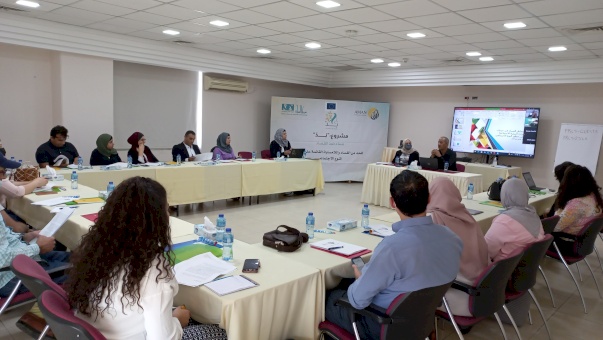
In a workshop held by AMAN and Women’s Center for Legal Aid and Counselling,
Gender-sensitive preventive measures should be taken to reduce corruption risks in social development service provision to women
Ramallah – In partnership with the Women’s Center for Legal Aid and Counselling (WCLAC), the Coalition for Accountability and Integrity (AMAN) held a workshop to discuss a draft study on Risks of Gender-based Corruption in Social Development Service Delivery for Women. The workshop brought together representatives of the Ministry of Social Development (MoSD), Palestinian Anti-Corruption Commission, and a number of women’s organisations and human rights actors.
The author, Ms. Hadeel Qazzaz, made a presentation on key findings of the study. An investigation and analysis reviewed risks of gender-based corruption in the processes, structures, and mechanisms of social development service provision in the West Bank and Gaza Strip. The analysis had a particular focus on corruption risks for women when they receive various MoSD services. The study also diagnoses challenges to access social services and identifies the strengths and weaknesses of these services. The study comes up with a set of recommendations to develop mechanisms for managing the risks of gender-based corruption within the MoSD.
The study is primarily informed by an opinion poll conducted by AMAN in 2021. The poll involved a representative sample of women beneficiaries of social services, addressing their experience with the MoSD measures to prevent corruption in service delivery. The opinion poll was also built on focus groups in both the West Bank and the Gaza Strip.
A safeguarding policy enhances proactive prevention and protection against opportunities for corruption
The study concludes that a stated safeguarding policy against sexual abuse, exploitation, and extortion is lacking in the social development sector in particular. This policy provides a key buffer against corruption and abuse before they occur. Additionally, MoSD service delivery is not grounded in a gender perspective.
Opinion poll: 6 percent of women had to rely on patronage to have their needs fulfilled by the MoSD
Women are particularly affected by forms of corruption and mismanagement, including discrimination and stalling service delivery. According to the AMAN opinion poll on the impact of corruption on service provision, 20 percent of women beneficiaries of social development services said they experienced negligence or untimely service provision. In addition to suspicions of favouritism and nepotism, some respondents suffered from the perception that women are inferior in status. Just 6 percent of the surveyed women said they had to rely on patronage to access their needs. Moral and material interests are gained from service provision. In the Gaza Strip, 4 percent of the respondents stated they heard of women accessing services were subject to extortion or harassment by MoSD or directorate office staff. 64 percent of the women surveyed in Gaza replied that they heard that personal data (e.g. telephone numbers, social media domains) had been exploited by MoSD staff in order to engage in a relationship with service seekers beyond the scope of MoSD work. These practices go unreported due to women’s fear of the consequences of complaints.
By contrast, 88 percent of the surveyed women said they were willing to file a complaint in case they were subject to sexual exploitation and extortion by MoSD staff (officials or researchers). 57 percent of the respondents indicated that they would resort to the MoSD Complaint Unit.
The MoSD needs to play the role of social protection programme coordinator in Palestine
The study presents a set of recommendations to prevent risks associated with gender-based corruption. The MoSD needs to develop its capacity and play the role of a coordinator of social protection programmes in Palestine. The Ministry will liaise and monitor assistance provided by civil society, government, and NGO community. In the private sector, corporate social responsibility should be subject to the same level of transparency and accountability. Criteria for social responsibility will be proclaimed accordingly. The MoSD staff will receive annual training on gender and risks of corruption. Gender and measures to prevent and provide protection against corruption will be mainstreamed in the MoSD services.
Gender-based protection policies will be adopted, increasing confidence in complaint handling processes
The study further recommends that a policy be developed by the MoSD to address the risks of sexual harassment, extortion, and abuse. As a preventive measure, this will include a clear description of sensitisation and complaint mechanisms, while observing timeliness, confidentiality, and privacy in handling these issues. An emphasis will be put on media and community activity to raise awareness about the complaint handling system and ensure integrity, professionalism, and full confidentiality.
The study addresses a number of recommendations to civil society actors. These need to embrace policies and measures to safeguard against corruption as well as sexual abuse and exploitation. Civil society organisations will develop in-depth studies on risks of corruption in their workplace. Gender analysis and indicators will be used to do so. Awareness of complaint mechanisms will also be monitored and promoted.
